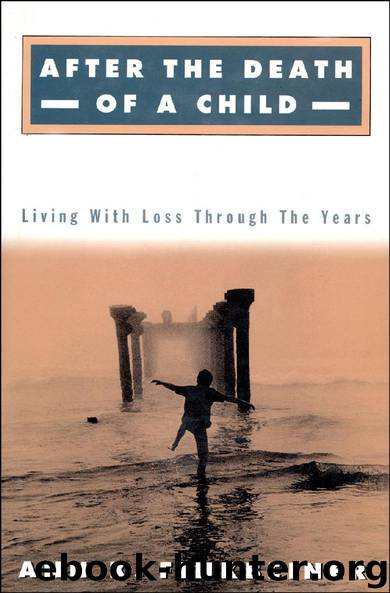After the Death of a Child by Ann K. Finkbeiner

Author:Ann K. Finkbeiner
Language: eng
Format: epub
Publisher: Free Press
Chapter 11
DELORES SHODA AND THE UNCERTAINTY OF LIFE
Delores Shoda’s son, Larry, died of melanoma seven years ago. Delores was the only parent who said that neither she nor her husband felt guilt; nor did she follow up by saying what she did feel guilty about. I believed she felt no guilt, though not feeling guilt didn’t mean she felt no responsibility for Larry; she did. It only meant she didn’t blame herself for anything surrounding his death. But because she didn’t, she had a problem. Who or what was to blame? Why did Larry die?
Answering that isn’t easy. Is God to blame? Is life, or fate, or any other synonym for something that happens for no good reason? Finding someone to blame, even if that means blaming yourself, wrote Colin Murray Parkes, a psychiatrist specializing in the reactions of grief, “is a less disturbing alternative than accepting that life is uncertain.” At the time of the interview, Delores hadn’t answered those questions yet; she seemed to be in the process, subtly and indirectly, of facing uncertainty.
Delores is married, has one married daughter named Laura who lives out of state, and a granddaughter, Chelsea. Delores has a small, quick voice. She has an odd verbal habit: instead of saying “I,” she often said “you,” as in “you have bad memories for three months.” Sometimes she alternated between “you” and “I” in the same sentence: “when you’re out playing golf, the butterfly lands on your ball, and I always think about him.” This verbal habit made her sound as though she were keeping some distance from what she was talking about. She also talked as if I weren’t there, as if she were reading notes from some internal screen, as if my questions triggered an interior monologue that required neither audience nor response. I don’t mean to imply that I felt she was distant or closed-off. On the contrary, I felt like her diary.
Larry died on the day after he passed the bar examination to practice law. At the start of the interview, before I could ask Delores any questions, she began telling a series of stories about Larry’s last days, how hard he had tried, and what she could or could not do for him—in short, how responsible she felt for him.
“I personally don’t feel any guilt,” Delores said. “Larry had a good life. He hadn’t been at home since he was seventeen; he was an adult. We raised him, we were able to tell him how we felt about him, how he brightened our life.
“One time I told him—when his sickness all started and he said, ‘What’s the use?’—I said, ‘You can’t give up. You have to make yourself go on. You absolutely cannot give up.’ Then when he was in the hospital, he looked at me and he said, ‘Ma, I didn’t give up.’ And I just about fell apart.
“Another time in the hospital he was thinking about one of his coworkers who was arrested for petty theft. Larry had sat with this young man, and the police came and handcuffed the young man and took him to jail.
Download
This site does not store any files on its server. We only index and link to content provided by other sites. Please contact the content providers to delete copyright contents if any and email us, we'll remove relevant links or contents immediately.
| Grief & Bereavement | Hospice Care |
| Pet Loss | Suicide |
They Both Die at the End by Adam Silvera(8611)
Thirteen Reasons Why by Jay Asher(7788)
The Space Between by Michelle L. Teichman(6087)
Suicide Notes by Michael Thomas Ford(4272)
Tuesdays with Morrie by Mitch Albom(3832)
Suicide: A Study in Sociology by Emile Durkheim(2609)
The Checklist Manifesto by Atul Gawande(2202)
Tuesdays With Morrie by Mitch Albom(2172)
Robin by Dave Itzkoff(2005)
In the Woods by Tana French(1996)
Bossypants by Tina Fey(1987)
No Ashes in the Fire by Darnell L Moore(1981)
Reservoir 13 by Jon McGregor(1852)
End of Days by Sylvia Browne(1823)
Olive Kitteridge by Elizabeth Strout(1790)
Bus on Jaffa Road by Mike Kelly(1784)
All Things New by John Eldredge(1781)
Scar Tissue by Anthony Kiedis(1769)
No Time to Say Goodbye(1759)
